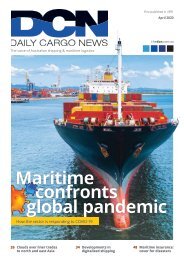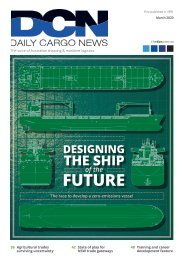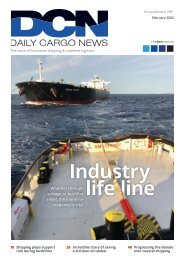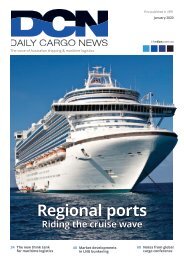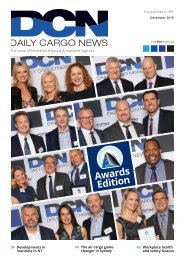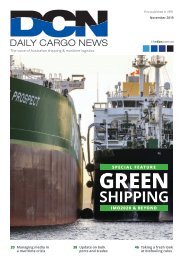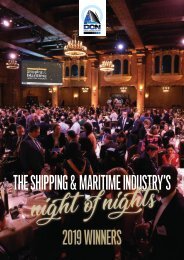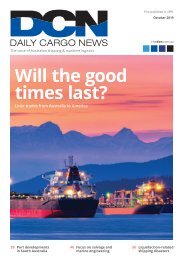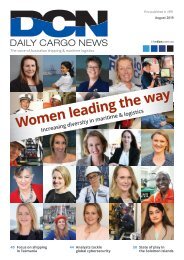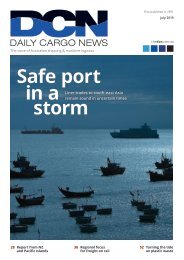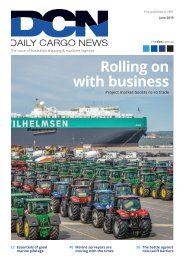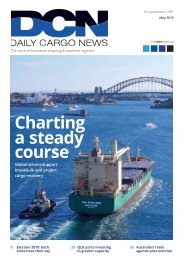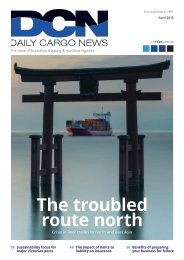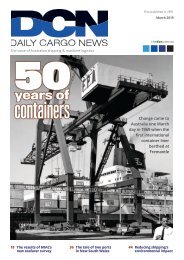DCN September Edition 2019
You also want an ePaper? Increase the reach of your titles
YUMPU automatically turns print PDFs into web optimized ePapers that Google loves.
CUSTOMS BROKING & FREIGHT FORWARDING<br />
AM for industry legend:<br />
Kent Heazlett<br />
Kent Heazlett was recently made a Member of the Order of Australia (AM) for services to customs<br />
broking. He spoke with <strong>DCN</strong> editor David Sexton about his background in the industry and thoughts<br />
on the future.<br />
When and how did you get into customs broking?<br />
It was 1968. I started with a company called George Cornish Pty<br />
Ltd. I got into it because my father was at the time the shipping<br />
manager of department store David Jones in Sydney.<br />
What are your early memories?<br />
Back in those days it was very much paper-based. We had<br />
to attend Customs House in person to lodge customs entry<br />
documents and pay customs dues etc so it was a lot of leg<br />
work. As the industry evolved, the electronic side of things<br />
came into play. I saw a couple of ads in the newspaper for what<br />
was called, back then, a customs agent. I applied for two jobs<br />
and was offered both. I got home and said, ‘what do I do now?’<br />
My parents asked, ‘who did you like?’ It was Cornish so that was<br />
that. I started working at Cornish and lasted about 14 years. I<br />
left there and later worked for a couple of the multi-nationals<br />
for 10 years or so. Then later on, with a friend, we bought<br />
Cornish in 1989. We held it for 25 years and then sold it in 2014.<br />
What was your first task?<br />
The first task I was given was to do what was called ‘a survey’<br />
down at the wharves in Sydney. It was an importer of South<br />
American multi-coloured woollen cardigans. I went to the<br />
wharf and spoke to the fellows who looked after the damaged<br />
cargo, I went into what was called the ‘dead house’. I saw this<br />
guy in there wearing one of the cardigans (laughs). It was fairly<br />
obvious where they were damaged, probably here in Australia.<br />
With containerisation, all of those issues of damage and loss<br />
largely became a thing of the past.<br />
So when did the electronic revolution take place?<br />
The first electronic system that was introduced was a thing<br />
called COMPILE (late 1970s, early 1980s). That was the first<br />
electronic system for preparing customs entries. Customs<br />
entries probably took three or four days back then to be<br />
processed by the department. Today it’s like 30 seconds.<br />
You have a long connection with air cargo, what are some<br />
early memories?<br />
When I was starting out it was very early days of air cargo. The<br />
air cargo industry was going in Sydney. There was a block of<br />
buildings no longer than 100 yards outside the airport and that<br />
was it for the air freight industry. Nowadays you’ve got DHL<br />
and others with hundreds of acres of warehouse space.<br />
What are some of the other big changes you’ve seen in<br />
your time in the industry?<br />
I think the ‘customs’ part of the job has become easier with<br />
the electronic revolution whereas the focus on biosecurity<br />
has increased and that’s understandable. Overall the biggest<br />
changes have been in the area of converting what was a paper<br />
process into electronic systems. Containerisation was the<br />
other, it was equally as big a change as the electronic side.<br />
You were made a Member of the Order of Australia (AM).<br />
What was that for and what does it mean to you?<br />
The AM was for significant service to business and<br />
international trade. Some of my colleagues and peers got<br />
together – why they picked on me I don’t know (laughs). They<br />
made the submission unbeknownst to me. It revolved around<br />
my time working with the industry associations over probably<br />
a period of 30-something years. Back in the early days I taught<br />
at TAFE part-time after hours and became involved in the<br />
Customs Agents Institute which was basically the training side<br />
of the industry associations. Later I became chairman of the<br />
NSW Customs Brokers’ Council.<br />
Is the current working environment a good one for<br />
customs brokers?<br />
Good customs brokers are still doing very well. They have<br />
had to change their service to encompass the provision of<br />
freight forwarding services and the like. They have done that<br />
pretty well. But there are still a large number of successful,<br />
Australian-owned businesses that started out as customs<br />
brokers alone and then have developed into trucking or<br />
warehousing businesses as well as international freight<br />
forwarding. The business has changed a lot but the need<br />
for a customs broker is certainly still there. An experienced<br />
customs broker can save a client a hell of a lot of money, not<br />
just in customs duties. With free trade agreements I think we’ll<br />
eventually find customs duties are a thing of the past.<br />
Image supplied<br />
36 <strong>September</strong> <strong>2019</strong><br />
thedcn.com.au



